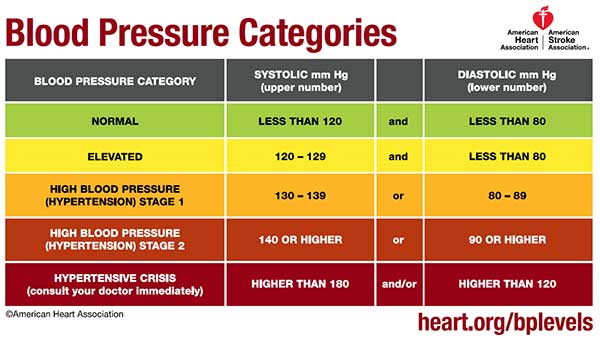Symptoms and Signs of High Blood Pressure or Hypertension
High blood pressure increases the risk of heart disease and stroke, two leading causes of death for Americans. Tens of millions of adults in the United States have high blood pressure, and many do not have it under control because of rare physical symptoms. That is why it is also known as the silent killer. (CDC)
High blood pressure occurs when the pressure in your artries is higher than normal. You can measure the pressure in your arteries. Do have high blood pressure? Do you know what signs to look for? You’ll find information about the common signs of high blood pressure in this article.
Most Americans usually tend to ignore high blood pressure. Even those who do go on medication only stay on the medication for a short while. According to studies, 90% don’t stick with the recommended regime. Unless the blood pressure is kept under control it could lead to serious problems with vital organ such as your heart, kidneys, brain and eyes.
When is High Blood Pressure and Hypertension an Emergency? 24-Hour ER
The normal numbers for blood pressure is 120/80. Between 120 and 140 is a pre-hypertensive stage that can be controlled by natural remedies such as exercise, watching your salt intake, quitting smoking, lowering cholesterol, and eating vegetables, etc. If your blood pressure goes over 140/90 then you would be considered to have high blood pressure, or a hypertensive patient.

How to Know if you have High Blood Pressure
High blood pressure usually has no symptoms, which is why it’s referred to as a silent killer. There are many symptoms associated with high blood pressure, including headaches, nosebleeds, dizziness, a flush face, and fatigue.
The only way to know for sure that you have high blood pressure is to measure your blood pressure. Doctors typically ask that it be measured twice daily – morning and evening. Measuring your blood prssure twice daily will overtime, allow you to get an accurate measure.
People with high blood pressure may experience many of these symptoms, but they just as often occur in those with normal blood pressure. If left for too long, or if the hypertension is severe enough, it can damage the brain and cause symptoms such as headache, fatigue, nausea, vomiting, shortness of breath, restlessness and blurred vision. In rare cases, it can even cause brain swelling which can lead to drowsiness and coma.
10 common symptoms of high blood pressure
High Blood Pressure of Hypertension does not typically show symptoms, but if you have any of the following ten symptoms, you should check your blood pressure immediately or see your doctor.
- Severe Headache
- Nosebleed (Epistaxis)
- Breathlessness
- Tinnitus (Ringing in Ears)
- Sleepiness, Insomnia
- Confusion
- Fatigue
- Excess sweating
- Vomiting
- Blurred vision
If you have not experienced the above symptoms, it does not mean you don’t have it as the most common side effect is that it has no symptom. The best way to stay healthy is to check your blood pressure regularly.
Frequently Asked Questions about High Blood Pressure and Hypertension
We must share with you to learn about what high blood pressure is and when you may be having a life-threatening blood pressure complication.
What is high blood pressure/ hypertensive crisis?
A hypertensive crisis is when the blood pressure increases, or spikes, drastically. This is considered a crisis because it could damage organs and blood vessels and lead to a stroke.
What causes spikes in blood pressure?
Many different things could trigger a hypertensive crisis. Some of the more common catalysts are: missing a blood pressure medication dosage, heart attack, stroke, kidney failure, or artery rupture. You can tell from this list that some issues will be much more critical as far as organ damage, so it is imperative to get to the ER for help.
Are there other symptoms to watch out for, along with a high blood pressure reading?
Yes, it would help if you watched out for chest pain, blurred vision, headache, nausea, pain in the jaw or arm, anxiety, shortness of breath, seizures, confusion, or a general lack of responsiveness. Coupled with a high blood pressure reading, any of these are causes for emergency response.
What kind of treatment will I get at the ER for hypertension?
If you are diagnosed with a hypertensive episode, you will be given oral or intravenous medications to lower your blood pressure. Damage will also be assessed. If the heart is involved or you’ve had a stroke, additional treatment will be given to address those complications.
Can a freestanding ER handle my hypertensive crisis?
Most definitely. We’re open 24/7 every day of the year. You’ll get a board-certified physician with many years of experience, so don’t hesitate to come in if you are concerned about your blood pressure reading or experiencing any of the above symptoms. At ER of Texas, you will find much of the same equipment as in a hospital-based ER, including what is needed to treat a hypertensive crisis, heart attack, or stroke. Without the long wait times, you will be comfortable, diagnosed, and treated in record time.
Nine convenient locations
ER of Texas has top-rated emergency rooom are available in nine locations for your convenience: Highland Village, Little Elm, Frisco, Hurst, Colleyville, Texoma, Hillcrest, Uptown, Mansfield and Dallas, Fort Worth, Texas surrounding communities.
Our ER is open 24/7 to help treat and diagnose minor and major emergencies. Our board-certified physicians are available 24 hours.




.jpg)